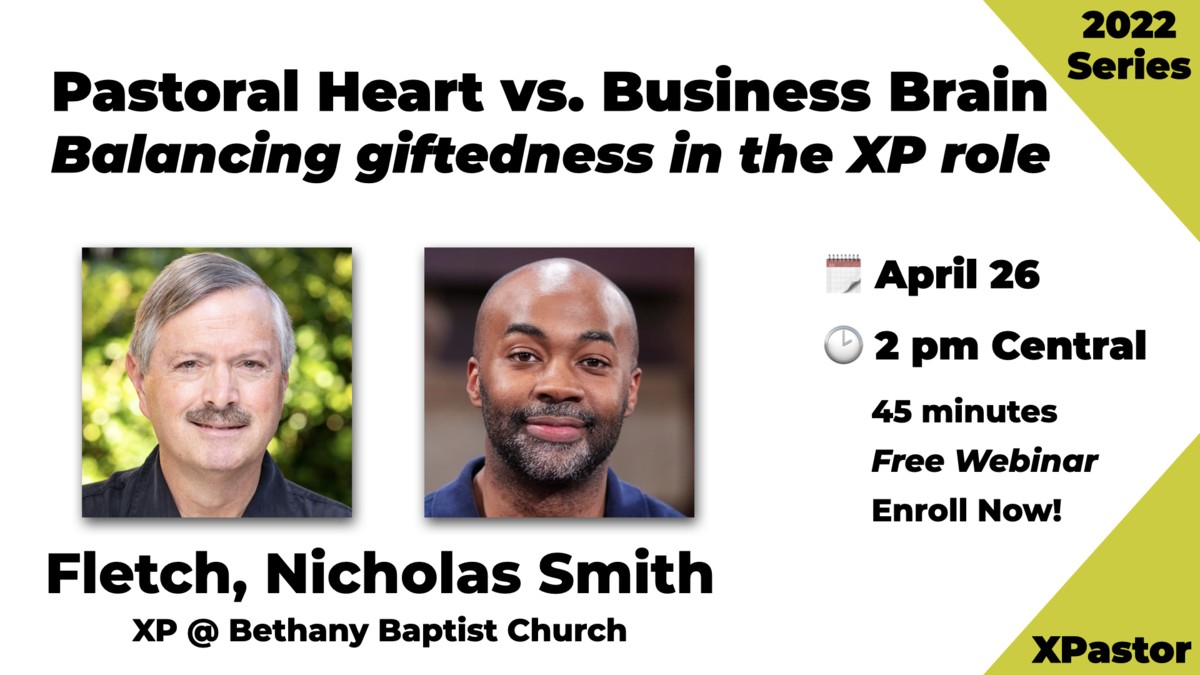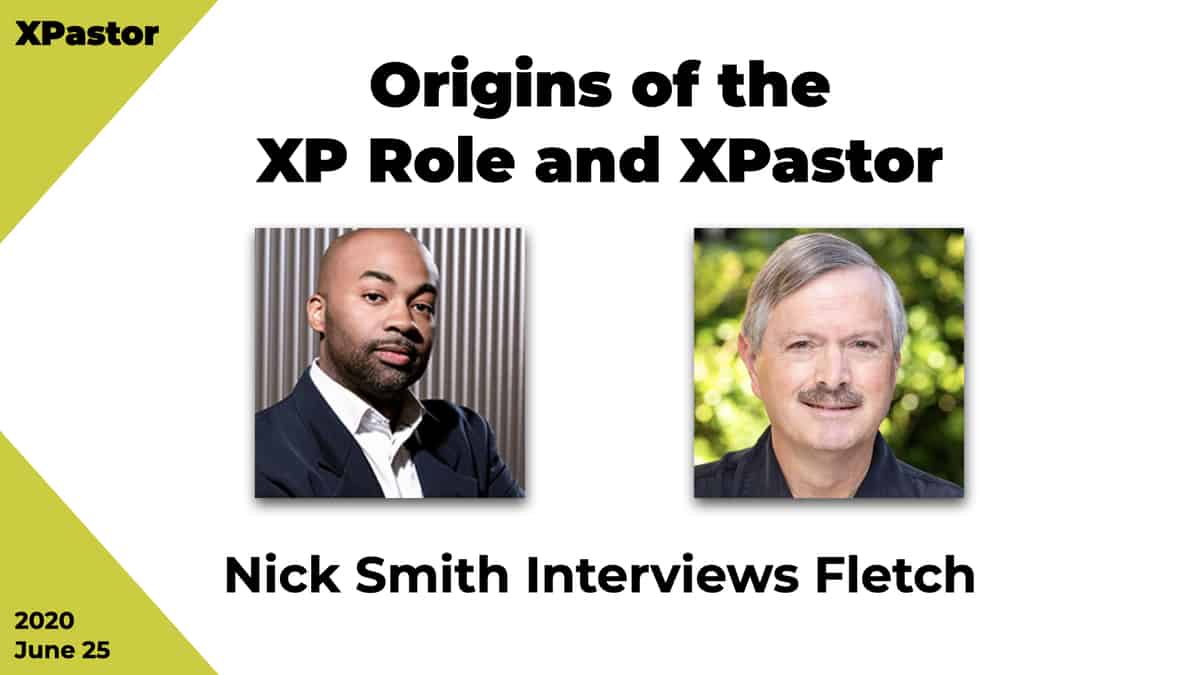Steve Roese is a Catalyst. Shakes up categories … no policy manuals or time cards—anywhere … visionary with an outreach heart … doesn’t allow second best … lightning rod for criticism … explains explosive issues … loves to think out of the box.
This case study will do Steve Roese little justice—how can one define a catalyst? The data here might give a backdrop to understand him. This case study discovers an Executive Pastor who implements the vision of the Senior Pastor and enacts the policies of the Elder Board. Coupled with strong church growth, few churches have had such a successful relocation effort as Irving. Irving added the position of Executive Pastor one year after relocating to their new church home.
The Purpose of Irving Bible Church
Irving Bible Church has a carefully defined purpose statement: “Engaging spiritually uninvolved people in the joyous adventure of pursuing Christ’s best.” The church gives an explanatory paragraph about the purpose statement:
Each word in this statement is carefully chosen. We want people at IBC to be ‘engaged’ in the Christian life—not entertained, not side-lined, not baby sat, but empowered, motivated, actively involved in life and the dynamic pursuit of spiritual truth. We want to engage ‘spiritually uninvolved people,’ either unbelievers who desperately need to meet and love the Savior or believers who have been shelved by spiritual ineffectiveness or lack of opportunity. We want to engage people spiritually in the ‘joyous adventure’ of knowing, trusting, and obeying Christ, helping them to experience God’s grace, goodness, and greatness in ways which charge their souls and overflow their hearts with joy. And we want people to be passionate for ‘Christ’s best,’ the highest and holiest and grandest calling in life to which any believer can aspire and for which any price is ultimately worth.
The church seeks to live out this purpose statement in diverse ministries. As is seen later in this section, Irving endeavors to live out the vision statement even in the design of their buildings.
Governance
Irving Bible Church is an Elder-led church with a conservative evangelical doctrinal statement. The church Constitution requires “the government of the church shall be vested in the Board of Elders who, as the elected representatives of the people, provide leadership to the church under the direction of the Holy Spirit.” Elders are approved by a two-thirds majority of the congregation for a three-year term, which may be renewed. Article IV, Section 2 of the Constitution defines the role of the Elders at Irving Bible:
The elders shall be responsible to shepherd the flock through guiding and assisting the members of the church and guarding them against false teaching (Acts 20:28 ff.; 1 Pet. 5:1-3). They shall lead the flock through their godly example (1 Pet. 5:3), teach and exhort (1 Tim. 3:2; Titus 1:9), refute those who contradict truth (Acts 20:29-31; Titus 1:9), and pray for the sick when summoned (James 5:14). As the highest governing body in the church, they shall be responsible for the overall management of the church (1 Tim. 3:5, 5:7) by setting policy, by approving an annual budget and ministry plans, and by holding the Senior Pastor accountable to oversee the staff in executing them.
Thus, the Elders are ultimately responsible for the church and hold the Senior Pastor accountable to oversee staff in the implementation of policy. The Constitution does not mandate the size of the Board of Elders. Based on the Constitution, an organizational chart for Irving can be constructed (see PDF below article).
The Constitution and organization chart allow for, but does not mandate, an Executive Pastor.
Deacons can be elected by a two-thirds majority of the congregation for a three-year term, which may be renewed. Article IV, Section 3 defines the role of the Deacons:
Deacons shall be responsible to serve the needs of the congregation under the authority of the elders. Such areas of service include but are not limited to the care and upkeep of church grounds and facilities and the administration of benevolences. By fulfilling these responsibilities, deacons free Elders and Pastors to give their full attention to spiritual oversight.
However, by 2004 the role of Deacon was no longer functioning at the church. When this Constitution was approved in 1993, one can see signs of delegated responsibility, allowing the Elders and Pastors to focus on spiritual oversight. There is no limit given in the Constitution as to the quantity of deacons, nor does the Constitution band the deacons together into a Board of Deacons.
The Constitution of Irving Bible Church also addresses the responsibilities of the Senior Pastor in Article IV, Section 4:
The Senior Pastor is responsible to preach and teach the Word of God, to contribute leadership to the Elders while remaining accountable to them, and to manage and direct the staff team in accomplishing the ministry goals of the church within the parameters and budgets approved by the Board of Elders.
Again, the Constitution does not mandate the position of Executive Pastor, but does specifically allow for delegation of responsibility by the Senior Pastor. Section 5 of Article IV addresses “Other Pastoral Staff”:
The recommendation to call or dismiss other staff pastors shall come from the Senior Pastor. The call or dismissal of pastoral staff shall come from the Board of Elders.
Pastoral staff responsibilities shall be assigned by the Senior Pastor or his designee in accordance with the skills and job description of that staff minister. All staff shall carry out their assigned ministries according to the annual ministry plans and budgets approved by the Board of Elders.
The Constitution specifically addresses staff that are not pastors in Article IV, Section 6: “The Senior Pastor or his designee shall be responsible for the selection, supervision, and dismissal of non-pastoral church staff.”
The ability for the Senior Pastor to delegate responsibility allowed the Senior Pastor to take a sabbatical. In an article in the Dallas Morning News on clergy rest, the Executive Pastor of Irving is cited:
Irving Bible Church, where Senior Pastor Andy McQuitty has begun a summer sabbatical, allows its pastoral staff to take a three-month sabbatical after seven years. The Rev. Steve Roese, the church’s Executive Pastor, said Mr. McQuitty hasn’t taken a lengthy amount of time away in his fourteen years at the church. ‘A sabbatical forces you to make sure your ministry goes on while you’re gone,’ Mr. Roese said.
‘It’s a tribute to Andy that he’s delegated such that he can step away. It will give our congregation a different perspective.’
Thus, by allowing for delegated authority, the Constitution of Irving Bible Church gives a foundation to the position of Executive Pastor.
Moving Towards the “Town Hall”
The buildings of Irving Bible are important in the recent life of the church as they show how the vision is being implemented! The history of the church gives a background to the inception of the position of Executive Pastor. Irving Bible Church began on Easter Sunday, 1962. In 1966 the church purchased four acres of land on Finley Road in Irving and built a thirty by forty foot meeting room for worship services. In 1970, “a new sanctuary was built under the leadership of Pastor Chuck Swindoll.” The surge of growth under Dr. Swindoll stalled after he left the church: “After several difficult trials in the late 70’s and early 80’s, the church found direction and experienced God’s blessing. The resulting growth would take the church from a low of 250 in the mid 80’s to its current army of thousands.” Andy McQuitty became the Senior Pastor in 1987 and the church began to grow again.
With the growth in the late eighties, the church built an education center for 1.2 million dollars; “Ironically, the church grew so much during the construction phase that the building was at capacity on the day it opened.” The church raised three hundred thousand dollars to “reduce debt and position the church for later expansion.” Irving launched “Accepting the Challenge” in 1994 as “it was realized that relocating the church was the only way to accommodate the growing number of folks touched by God through IBC. … The congregation was presented with a goal of $1.5 million. They responded with $1.9 million to start the relocation effort—even though they had no idea to where the church would move.”
Irving culminated the relocation capital fund drive in December, 1995. Pastor McQuitty wrote: “Foundational to the success for this campaign was the creation of discontent with the status-quo and the instillation of confidence by demonstrating thorough planning.” Irving announced Vision 2000 on May 19, 1996 in an all-church celebration. McQuitty noted: “The goals of this event were to create a greater sense of unity, to delineate godly motives for the relocation of the church, and to foster a broader perspective of the ministry of IBC by forecasting coming innovations.”
McQuitty preached a sermon series out of the book of Joshua in July and August, 1996, to address the challenges of upcoming relocation. Irving published a Book of Memories in August, 1996, and created a Memorial of Bricks to allow people to show appreciation for the new location. Irving held a Celebration of Remembrance service on September 1, 1996 to bring closure to the former church building. Irving celebrated Seven Pillars as a dedication of the new building and relocation in October, 1996. “We invited Dr. Stanley Toussaint, former pastor at IBC from 1965-1967 and then again from 1973-1977, to speak in the new sanctuary at IBC at a special service kicking off a four-day dedication weekend.”
A year after the congregation moved to the new building, Steve Roese began as Executive Pastor. The Senior Pastor and four of the pastoral staff of Irving Bible Church were at the church when he was hired. In a group discussion with twenty of the staff, the five commented on the state of the ministry before the Executive Pastor joined the staff. One staff member said that “we were islands of people doing ministry. We needed accountability.” Another person said that “we were deer in the headlights. We had a rapidly growing ministry and needed expertise.” A third person said that “we needed an overseer of ministry. Andy’s time was becoming limited.”
The Senior Pastor commented on the former close relationships on the staff, that “we used to have staff meetings every day, informally gathering for lunch. Then, we grew and added ministry.” The Senior Pastor was beginning to feel stretched and he said that “the staff needed encouragement, oversight and accountability. I couldn’t keep it going. We needed a creative person to keep us going.” As to the timing, the Senior Pastor and staff discovered the tension before the Board. “We discovered this a year or so before the move. The Board needed a couple of years to see the need.” As to the thought of adding an Executive Pastor, “we knew that things were going to be different when an Executive Pastor came, almost a grieving for the old days of a small staff. But, we were living in an illusion that they were still that way.” Thus, Irving saw the need to have a person focus on oversight and accountability of staff and church ministry.
In late 1997, Steve Roese assumed the position of Executive Pastor with a job description outlining three main areas. The first area is to execute the vision of the Senior Pastor with the staff. This includes overseeing the staff, leading the management team meetings, and streamlining authority paths “while minimizing bureaucracy.” The second area is to coordinate church ministries for maximum efficiency, including conducting search processes, dismissing and repositioning staff. This area incorporated responsibility to oversee the development of, and adherence to, the budget. The description also calls for the coordination of new initiatives with the staff. The third and final area of the job description includes the casting of vision for adult ministries and initiating new ministries. The implementing of this job description, and the role of the Executive Pastor, will be examined in the Interview section below.
In November, 2000, the church launched “Proceeding On,” a campaign to build a new worship center. The facilities were opened in August, 2002. “Since the campaign was launched, the number of people calling IBC home has doubled. We consistently see more than 4,000 souls on campus each week. Over 5,000 attended our Easter Service this year.” By 2003, Irving received $5.5 million of the $6.5 million pledged to the project and the church was pleased to announce that “… we have kept our debt service to within 20% of revenues.”
The new worship center sought to live out the church’s vision statement. The new building included a coffee shop and a “Town Hall” to create a public meeting place:
Folks have been sticking around for coffee after church services for generations, but something else is going on at Irving Bible Church, the megachurch on whose 17-acre campus a coffee shop recently opened. The Ugly Mug Coffee Co. is not a church-run business, nor does it keep hours related to worship services. It’s there to help anchor Irving Bible Church’s ‘Town Square,’ which includes a large playground and other amenities, and is part of IBC’s attempt to bridge the separation of church and life. In doing so, megachurches like Irving Bible Church are changing the way suburbanites live, and they are showing why management guru Peter Drucker called them ‘the most important social phenomenon in American society in the last thirty years.’
A concept for further study is Drucker’s quote. As has been noted previously, there is a rise of megachurches in America, and there are apparent significant sociological shifts occurring. Irving appears to be at the nexus of such change and is embracing it in the design of their buildings.
In the same spirit as Gilbreath calling Dallas “The New Capital of Evangelicalism,” the article about Irving continues. It describes the genesis in Dallas of a significant “integration” of church and civic life.
Church used to be a place you went on Sunday morning, and maybe returned to for Bible study or midweek services. But visionary pastors like the late W.A. Criswell of the First Baptist Church in Dallas noticed early on a hunger for rootedness and community. Dr. Criswell and others conceived of the church as more than just a place to pray and study Scripture. It could also be the focus of social life, and even commerce. The genius of this approach can now be seen all over the Dallas-Fort Worth area, which is home to more thriving megachurch campuses than anywhere else in America.
The purpose of Irving’s “Town Hall” is captured by the article and is an implementation of the church’s vision statement.
This is an old idea. In the Middle Ages, cathedrals were the sun around which a city’s social and commercial life orbited. Megachurches like Irving Bible Church are reviving the idea by opening their campuses to everyone in the community and providing them a safe, clean, wholesome place to socialize, play with their kids, participate in athletics and the like.
What’s different—and perhaps troubling—is how these new ‘town squares’ are essentially private spaces masquerading as public ones. You could see them as representing a withdrawal from public life, and even a loss of faith in the idea of a common existence. You wouldn’t be entirely wrong. But in a time of cultural fragmentation, when the loss of respect for authority and a commitment to shared values turns the public square into a more dangerous place, the controlled environment provided by megachurch ‘town squares’ and commercial ventures such as CityWalk in Los Angeles is rightly welcomed by families. After all, these churches wouldn’t be so mega if they weren’t doing something right.
The design of the building is one aspect of the implementation of the vision statement.
Another aspect of implementing the vision of the church is the multidimensional purpose of the coffee shop. The shop begins as a cozy “hang out:”
‘It’s a comfortable place where people can come and get delicious coffee and hang out,’ said customer Alissa Kindall of North Richland Hills. ‘Even if there are a lot of people here, you can still find a quiet spot and relax.’
Interestingly, the owners of the coffee shop have evangelical roots that align with the church’s heritage and values:
Providing a respite for coffee-drinking college students led owners Mark Ottinger and Tim Burleson to open their first Ugly Mug Coffee Co. in Memphis, Tennessee, five years ago. The owners wanted to expand, and Texas seemed a logical choice for their second location. The former members of Denton Bible Church met as students at Dallas Theological Seminary.
‘We’re excited about being in Irving and the Las Colinas area,’ Mr. Ottinger said. ‘It seems a natural fit to partner with a church that’s doing things around the world.’
This summer, Irving Bible Church’s missionary and outreach programs will travel to Africa, the Amazon, China, Honduras, India and Russia. The Ugly Mug Coffee Co. is committed to helping coffee growers in Third World countries make a living, Mr. Ottinger said. The company’s slogan is ‘Better Beans for a Better World.’
An apparent value of the church is the integration of the vision statement in every area of church life, from building design to business partners.
Irving’s seeks to implement their vision statement through a second website. The church has a main website at www.irvingbible.org. This website is similar to other churches mentioned in this dissertation. It outlines the church’s various ministries and is “content driven.” A second website, www.churchdreams.org seeks to live out the vision statement: “engaging spiritually uninvolved people in the joyous adventure of pursuing Christ’s best.” In a special page on visiting the church, advice is given:
Relax. This is the single most important word of advice that we can give to someone new to IBC. We want you to come as you are and be yourself. This means that if you can connect with God more easily in your blue jeans, then slap on your Levis. It also means that if a suit and tie helps you focus and prepare for worship, then wear that. Our focus is not on who wears what but whether people are connecting—with God and with their neighbor.
The website is worth special attention as it has drawn the spotlight of the media:
Website designers for places of worship will profit from checking out this site offered by Irving Bible Church. Designed specifically for visitors, it speaks directly to their concerns (the church has a separate website, IrvingBible.org, aimed at members).
Rather than barrage visitors with a schedule of church activities, the site takes a minimalist approach. Pages fade in and out with messages: ‘We dream of a church where people are free to attempt great things for God … where all kinds of people serve God in all kinds of ways … where creativity and innovation are honored, not feared.’
Visitors can then follow links into a Q&A on the nature of God and the Christian faith. Next, there’s a quick ‘orientation’ on visiting Irving Bible Church—what to wear, what to expect, and information on worship times and child care.
Does Irving Bible Church live up to its dreams? You won’t find the answer on the website; you’d have to visit. Exactly.
Irving Bible Church has apparently succeeded in “engaging spiritually uninvolved people,” as the author of this item in the Dallas Morning News reflects that the website is “designed specifically for visitors.”
There are other areas of church ministry that could be mentioned, such as outreach events and arts ministry. However, the purpose of this investigation is to give an overview of the church. It has been seen that Irving has a strong vision statement and is endeavoring to live it out. The relocation of the church in 1996 brought great growth and ushered in the tenure of the Executive Pastor.
The Executive Pastor
In a group discussion, twenty of the staff commented on the ministry of the Executive Pastor. In describing Steve Roese, they see a caring, sometimes tough, implementer of vision: One staff member said, “He’s a visionary with a heart for outreach, but he did not let us stay comfortable with our own little group. He hurts for the lost.” The staff sees that Roese sets a positive tone among the staff: “There is a ‘fun’ atmosphere here. We move forward to bigger and better things.” While it can be “fun,” there is a serious side to the ministry as one staff member commented that “we needed a vision implementer and he doesn’t allow for second best.” The staff perceived that some Executive Pastors hold the Senior Pastor and staff back from rapidly advancing ministry, but “Steve and Andy are on the same page. Steve doesn’t hold Andy back.”
The staff also perceived that some Executive Pastors are “numbers guys” who focus on finances, not on implementing vision. One staff member summarized this line of thought: “The Executive Pastor at my old church was a numbers guy, but Steve says and means ‘whatever it takes.’ God’s going to do great stuff. The old church guy said ‘is it broken?’” In terms of implementing vision and challenging the staff, one member summarized that “He gives us the freedom to fail, to try to do something better.”
The staff commented on the difficult aspects of being an Executive Pastor. One member said that “Steve is a lightning rod for criticism. He explains explosive issues.” It can be difficult to unite the roles of Executive and Pastor, as another staff member commented: “On the boss-pastor mix, Steve is an incredible friend, yet he also gives me tough notes about ministry. He keeps it in balance.” The pastoral care is evident with the staff, as a third staff member said: “He cares about your family. On my first impression at a job interview, I didn’t know if I liked him. At the second interview, I decided I could go into battle with him. He asked tough questions. He cared enough to ask tough questions. My old church didn’t do that.” Transitions can be difficult and there have been some at Irving. One staff member commented on this, that “he has a heart for staff to serve in their area of giftedness and passion of ministry.” Roese is readily available for the staff as “his door is always open. He is loyal to the staff. He stands in the gap for us.” Thus, the staff of Irving Bible Church see the functional need for the Executive Pastor.
Steve Roese has been the Executive Pastor at Irving Bible Church since late 1997. He enjoys the fact that the staff wrote his job description. This signifies for him that there was staff acceptance of him from the beginning of his tenure. As Roese is the first Executive Pastor at Irving, he points out that “usually the first guy doesn’t last.” Steve sees the staff-written job description as a solid starting point and at the same time he smilingly admits that he doesn’t see his job description often. This fits with the line in the description that reads, “streamline and define communication and authority paths on the IBC staff that maximize personal creativity while minimizing bureaucracy.” As for being the first Executive Pastor at Irving, he says: “You are doing what the Senior Pastor has done for so long, but the Senior Pastor gets respect from preaching each week. You must get in the pulpit for trust.”
Steve sees the role of the Executive Pastor as freeing the Senior Pastor to focus on preaching and church vision. Because of this, Steve recently advocated to a church of four hundred worshippers that they not hire an Associate Pastor or Church Administrator. He recommended the Executive Pastor position because “the Executive would look after getting key people on and off the bus, whether volunteers or paid.” Steve recommends that churches, both large and small, take the role of the Senior Pastor and divide it: “Don’t hire an Administrative Pastor as the Senior Pastor isn’t doing that work now! First, take the load off the Senior Pastor,” he says. “Most churches are looking for an Executive to do staff reviews and strategic planning. I am different than that. Others may be the norm. I love to think out of the box, as my business card says ‘Catalyst.’”
Steve defines the Executive Pastor through an analysis of the Senior Pastor. “Define who the Senior Pastor is and staff for his weaknesses, not his opposites.” In the Senior and Executive Pastors relationship, Steve sees that “trust is the number one issue.” He sees that the Senior and Executive Pastors must speak the same language, but not be carbon copies. He considers that they should genuinely enjoy being together. “Andy has strengths that I don’t have, so don’t make me the Senior Pastor. Andy has the gift of pastor, shepherding people, a great crisis caregiver, just a magician at it.” Steve meets with the Elder Board only as necessary, not regularly a part of their Monday night meetings. Steve comes to the Board when there is a need, bringing an item or being given an assignment. Relationships between staff and Elders come through an annual retreat; all pastoral lead staff attend, as do all Elders and spouses.
With the Senior Pastor present, Steve runs the staff meetings. “Andy is hands-off with regards to the staff, and only steps in when he needs to; he encourages the staff. Many Senior Pastors won’t let go and want to drive the staff meetings.” Steve reports that Andy once said to him, “Steve, I’m not in charge at this meeting, you are, so you run it.” Steve says most Senior Pastors want to be the spokesman at staff meetings, yet speak for seventy-five percent of the meeting. At Irving, there are meetings three times per month for all pastors and directors. Twice a month, all forty support and pastoral staff meet. Steve desires that there be little formal agenda, but that people “sit in bean bag chairs, discuss church ministry and pray together.” In 2002, the staff was restructured; before that twenty people reported to Steve. Steve meets once a month for a lunch with all the lead staff, lasting about two and a half hours. The lead staff is comprised of six male or female team leaders, plus Steve Roese and Andy McQuitty. The team leaders are 1) Operations and Finance, 2) Worship Arts and Next Generation Ministries, 3) Community Development, 4) Communications, 5) Children and Youth and 6) Leadership Development.
When it comes to hiring new pastoral staff members or lead staff, Steve is the “point person.” He surfaces several candidates and asks a team of staff and volunteers to interview each candidate. Steve serves on the team, but it is the team that makes a consensus recommendation to the Senior Pastor and Elders. In the hiring process, Steve sees himself at the facilitator of the discussion rather than the decision maker. He views the number one priority of an Executive Pastor is to hire the right people. This is critical for Steve as he desires a staff with vision and creativity. He desires a “wide open staff structure, anyone can insert anything; it’s interactive; no staff policy manual; no timecards; no vacation schedules; this is for everyone, not just salaried people; and this would be a problem if we had a bad hiring system.” Instead of annual reviews with the staff, they have discussions. As far as an annual review for Steve, he might say that he has an ongoing discussion with the Senior Pastor. This is an outworking of a cultural philosophy that values the quality of life, delegation, and the priesthood of believers.
In area of budget development, Steve requires the lead staff to develop budgets in their ministry areas. He then discusses the budget with the lead staff member, makes suggestions, and recommends it to the Elder Board. In his own words, “I don’t say ‘no’ very often as we have competent people who work carefully with money.” This does not mean that the budget process is always easy. In the last year, the church cut $400,000 from ministry expenses, with some new initiatives being put off. The current budget is 7 million dollars, with 1.2 million in debt service and .5 million in missions. Steve determines raises only on those who report to him. Final approval for all raises is made by Elders through the budget, making raises an annual event as a part of the annual budget cycle. He views staff compensation as equitable, “well enough for us all as staff to live but not by any means excessive.”
Steve preaches four or five times a year. He sees that the amount of preaching he does is an issue of time and giftedness: “I wouldn’t want to produce a sermon each week, it’s not my passion.” Steve loves to preach on an occasional basis, but doesn’t want the burden to prepare. “Andy has the gift of wisdom in choice moments; I like to handle so much so that Andy can listen to people more.”
Steve’s schedule reserves Mondays for meeting with staff and follow ups from Sunday. On Tuesdays, he has meetings with staff, lunches with staff and people in the church. He leads a Bible study lunch on Thursday and does some counseling as well. Fridays are set aside for envisioning and growing. He views his work week as Monday through Friday, working about fifty hours per week.
Steve keeps life in balance by building balance into church culture; he prefers “lots of culture and very little structure.” As to culture, “most people would say IBC is post-modern, but I’m not sure we would say it or like it. Post-modern is okay, but is has a lot of baggage. Some see Leonard Sweet and his book Post-Modern Pilgrims as lacking functionality. You can have a church that is so cool but nobody comes.” Steve likes to help envision where Irving could and should be in ministry. He does this by reading widely. Generally he stays in touch with many folks through his natural networking skills.
In the recent building of the new worship center, Steve led the charge. When asked, “Why you?” Steve replied, “Because a building should express vision and I am the implementer of the Senior Pastor’s vision. We didn’t have a Building Committee but a team. We spent our first times together just dreaming. We refused to move ahead until we found the right architect, and it turned out to be a non-church one! So many church architects don’t listen to you.”
Although Steve Roese’s business card cites him as “Catalyst,” he is much more than that. Steve spearheads the staff hiring process and builds consensus on the leadership team. In terms of the purpose of this case study, Steve implements the vision of the Senior Pastor and desires of the Elders.
Executive Pastor Indicator
(See PDF below article for charts).
At Irving Bible Church there was a high rate of response to the XP-I, including the Senior Pastor, Executive Pastor, nine pastoral staff and six Elders.
The Assistant Role is included in Roese’s job description: “Give vital feedback to Senior Pastor on rate and speed of implementation of the vision, required resources, etc.” Regarding the Executive Function, Andy McQuitty, the Senior Pastor, presents identical findings to Steve. The Executive Role is included in Roese’s job description: “Execute the vision of the Senior Pastor with the staff. Commit to the vision and become creatively involved in its development. Oversee and support staff in understanding and fulfilling vision in their area of ministry. Set specific, measurable goals with the staff and manage the feedback loop to insure that goals are being achieved.” Steve Roese indicated his thoughts on the subject when he said: “Most churches are looking for an Executive to do staff reviews and strategic planning. I am different than that. Others may be the norm. I love to think out of the box, as my business card says ‘catalyst.’” The pastoral staff and Elders view Steve, though, in a strong Executive role.
The Five Focused Functions show the day-to-day functions of the Executive Pastor. In these functions there is a high degree of similarity between Senior Pastor, Executive Pastor, pastoral staff and Elders. Steve Roese presents strong Catalyst and Mentor Functions.
Steve Roese does not see himself as a typical administrator, such as developing policy and procedures. However, he administrates the church by supervising the budget, delegating facilities and grounds to others, determining compensation, ensuring budget development and supervising operations. This is seen in his job description: “review goals, resources (facilities) and budgets, communicate details and coordinate events and facilities’ scheduling,” “oversee budget development, budget adherence and cash flow with financial administrator,” and “institutionalize policies and procedures.”
The Senior Pastor of Irving also sees strong Catalyst and Mentor Functions in the Executive Pastor:
The Catalyst Function is resident in Steve Roese’s job description. This function is the dominant function in his job description:
- Cast vision for adult ministries and initiate new ministries as God leads. Develop a streamlined, biblical purpose statement and philosophy of ministry for adult discipleship.
- Cast vision for how this might look at IBC in the next five years. Repurpose adult classes and seminars so that they are purposeful and progressive in meeting the stated goals of adult discipleship at IBC.
- Launch new adult ministries consistent with the IBC adult ministry vision. Spearhead the development of small group ministry at IBC.
- Work with Rick Knight and/or other volunteer small group personnel to keep the ministry publicized, operating effectively and growing.
Nine pastoral staff members report similar findings on their XP-Indicators taken on Steve.
The Mentor Function is visible in Steve’s job description: “Handle personnel conflicts and troubleshoot programming problems. Lead management team meetings by creating agendas and facilitating their completion. Streamline and define communication and authority paths on the IBC staff that maximize personal creativity while minimizing bureaucracy.”
The Six Elders of Irving report similar findings. They report a slightly stronger Overseer Function than the others.
Steve’s job description contains elements of the Overseer Function:
- Supervise the adult ministry administrator who is responsible for implementing the ongoing programs in adult ministry.
- Conduct formal search process in hiring staff and also the formal procedure in dismissing or repositioning of staff.
- Coordinate IBC ministries for maximum efficiency.
- Coordinate with the staff new ministry initiatives from the congregation or church leadership.
It may be that as Elders they interact with the Executive Pastor on Overseer Function issues.
Another way of understanding the results of the XP-Indicator is to examine the questions that scored with clear answers. When the results of all seventeen respondents are compiled, there are ten questions which averaged a “never” or “rarely,” which correlate to a numerical score of “1” and “2.” This data can be seen in the following table:
| Question | Score |
| Preaches at least one-third of the time | 1.12 |
| Teaches a Sunday Adult Class | 1.44 |
| Performs weddings so the Sr. Pastor has time to focus on his ministry | 1.80 |
| Conducts funerals so the Sr. Pastor does not have to | 2.00 |
| Pastors just a part of the congregation as determined by job description | 2.25 |
| Reviews programs for only a small part of the entire church | 2.25 |
| Reports on finances for only a few areas of church ministry | 2.47 |
| Gives input on hiring personnel for only a few areas of ministry | 2.53 |
| Guards the schedule of the Sr. Pastor | 2.75 |
| Attends every meeting of the governing board, perhaps as a member | 2.94 |
The data represents that this Executive Pastor does not spend a great deal of time teaching and preaching. He does not guard the schedule of the Senior Pastor, or perform weddings and funerals in the place of the Senior Pastor. Though he does not regularly attend meetings of the governing board, he is not limited in shepherding, finances or hiring of staff.
While the preceding represents the low end of the scales, there are twenty-one questions which represent the high end. These questions averaged a response of “usually,” which correlates to a numerical score of “6.” The data can be seen in the following table:
| Question | Score |
| Guides the master planning process of buildings and grounds | 6.00 |
| Exhorts any staff member as deemed necessary | 6.06 |
| Represents church-wide finances to the governing board | 6.07 |
| Determines compensation for all staff | 6.13 |
| Oversees all church ministries | 6.18 |
| Discusses church-wide ministry with Sr. Pastor and governing board | 6.19 |
| Handles operations as Chief Operating Officer or has a subordinate COO | 6.19 |
| Facilitates hiring architects and contractors for new buildings | 6.31 |
| Motivates people to get involved in ministry | 6.35 |
| Delegates buildings and grounds management to subordinate staff | 6.38 |
| Empowers members to be involved in ministry | 6.41 |
| Envisions future ministry for the entire church | 6.41 |
| Works as the Chief of Staff | 6.41 |
| Ensures that budget development for the entire church is in line with vision | 6.50 |
| Encourages many congregants to volunteer for ministry service | 6.53 |
| Supervises all staff | 6.53 |
| Fills the position as the second in command to the Sr. Pastor | 6.59 |
| Challenges people frequently to improve ministry | 6.65 |
| Runs staff meeting and retreats | 6.65 |
| Occupies a powerful position | 6.71 |
| Sees the Sr. Pastor as the spiritual leader | 6.81 |
This data represents that the Executive Pastor oversees the master planning and building process. He oversees the budget process, ensuring that it is in line with church vision, and he represents church finances to the Board. He oversees operations and all church ministries, and discusses them with the Senior Pastor and Board. He is the Chief of Staff, supervising, exhorting and setting compensation. He motivates people to get involved in ministry. He envisions future ministry. He is in a powerful position as the second in command, running staff meetings and retreats. Yet, he sees the Senior Pastor as the spiritual leader of the congregation.
The Executive Pastor Indicator gives objective validation to Steve Roese’s claim on his business card that he is a catalyst. There are also strong and clear reports that Roese serves as a Mentor to the staff, encouraging them to be their best and serve in their area of giftedness. The strong Administrator Function fits Roese’s managing of the church, even though he diligently avoids bureaucratic rules and regulations. The Minister Function for most Executive Pastors is below the baseline and Roese’s fits this typical report. The Overseer Function ranges from slight to moderate, depending on the person giving the report. The data gives an accurate picture of Roese and his role at Irving Bible Church.
Executive Pastor Job Description
Execute the vision of the Senior Pastor with the staff.
- Commit to the vision and become creatively involved in its development.
- Oversee and support staff in understanding and fulfilling vision in their area of ministry.
- Set specific, measurable goals with the staff and manage the feedback loop to insure that goals are being achieved.
- Handle personnel conflicts and troubleshoot programming problems.
- Supervise the adult ministry administrator who is responsible for implementing the ongoing programs in adult ministry.
- Lead management team meetings by creating agendas and facilitating their completion.
- Streamline and define communication and authority paths on the IBC staff that maximize personal creativity while minimizing bureaucracy.
Coordinate IBC ministries for maximum efficiency.
- Review goals, resources (facilities) and budgets, communicate details and coordinate events and facilities’ scheduling.
- Conduct formal search process in hiring staff and also the formal procedure in dismissing or repositioning of staff.
- Oversee budget development, budget adherence and cash flow with financial administrator.
- Coordinate with the staff new ministry initiatives from the congregation or church leadership.
- Give vital feedback to Senior Pastor on rate and speed of implementation of the vision, required resources, etc.
- Institutionalize policies and procedures.
Cast vision for adult ministries and initiate new ministries as God leads.
- Develop a streamlined, biblical purpose statement and philosophy of ministry for adult discipleship.
- Cast vision for how this might look at IBC in the next five years.
- Repurpose adult classes and seminars so that they are purposeful and progressive in meeting the stated goals of adult discipleship at IBC.
- Launch new adult ministries consistent with the IBC adult ministry vision.
- Spearhead the development of small group ministry at IBC. Work with Rick Knight and/or other volunteer small group personnel to keep the ministry publicized, operating effectively and growing.
View the charts and footnotes in the original PDF: Irving Bible Church











